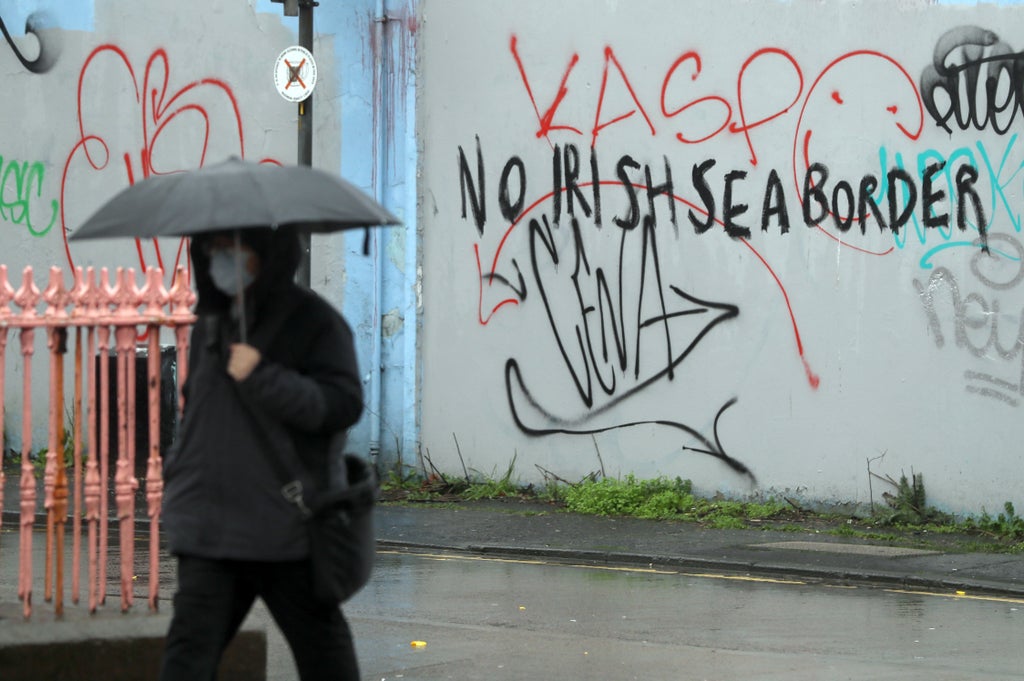
The EU’s Brexit negotiators have been given a firm instruction from the 27 member states that there can be no change in their mandate and no renegotiation of the Northern Ireland Protocol, Brussels’ ambassador to London has revealed.
Joao Vale de Almeida said no “credible alternative” to the protocol had been identified and warned that unilateral UK action to override it could “nix” the agreement altogether.
Foreign secretary Liz Truss is calling for more flexibility from European Commission vice-president Maros Sefcovic over British demands to cut checks on goods entering Northern Ireland, with the threat of legislation to unilaterally override the protocol if UK demands are not met.
But in a meeting of EU ambassadors last night, there was unanimous opposition to any change to the instructions given by the member states to Mr Sefcovic, which allow him only to look for technical improvements within the terms of the deal struck by Boris Johnson in 2019.
Speaking at a Westminster lunch today, Mr Vale de Almeida said: “It’s not very reassuring to go into a negotiation where you are presented with two options – either negotiation or unilateral action to override the treaty.”
Echoing Mr Johnson’s claim that he wanted to “fix not nix” the protocol, the ambassador said: “This is not the best way to fix, this is rather a way maybe to nix. If we want to fix it – which is what we want, and I understand that that is what the government wants as well – we need to create a better atmosphere.”
Mr Vale de Almeida said that Brussels has “low levels of trust” in the UK following this week’s announcement of planned legislation by Ms Truss, which he said appeared to “ignore” the solutions which have been offered by the EU over the past year.
“We were told that we should get a new mandate,” he said. “But I can tell you very clearly, what the member states are telling us is very simple: you don’t need a [new] mandate and even if you ask for one you will not get one.
“This is what we got from our member states and this is our starting point in telling our British friends that we believe we have put on the table… the potential of those proposals is not yet exhausted. There is untapped potential in those proposals for us to find the solutions, provided that we are focused on finding solutions.”
He warned that Brussels will respond firmly if the UK presses ahead with the proposed legislation – which would not only ease customs checks but breach Northern Ireland’s position in the single market by removing the role of European judges and giving Westminster new powers over taxes and subsidies.
“Unilateral calls for unilateral,” he said. “Action calls for reaction. Is that what we want? An escalation around Northern Ireland at this present point in time? I don’t think so.
“So my call on all of us is to contribute to creating the right atmosphere for the talks to continue. And you can be sure of our openness and availability to do exactly that, if the political mood on the British side is there as well.”
Mr Vale de Almeida said that the tabling of legislation by the UK government would be met by a response from Brussels, but said that any reaction would be “graduated and measured”.
Breaches of the protocol would allow the EU to retaliate with measures such as tariffs on UK exports and could even result in the termination – after 12 month’s notice – of the Trade and Cooperation Agreement, effectively plunging Britain into a no-deal Brexit.
But the ambassador said the EU still believes that disruption to trade caused by the protocol can be resolved within the context of the agreement struck in 2019 and is willing to keep negotiating on that basis.
“We will be the last ones to turn off the lights and close the door,” he said.
Those preventing the effective implementation of the protocol were effectively “blocking prosperity” in Northern Ireland, which has the unique advantage for businesses of sitting within the single markets of both the UK and EU, he said.
“If my information is not wrong, Northern Ireland's economy is performing better than the rest of the UK,” said Mr Vale de Almeida.
“If my assessment is right, investors are simply waiting for certainty and predictability in order to invest even more in Northern Ireland. So, in a way, blocking the proper implementation progress of the protocol can in fact contribute to blocking prosperity in Northern Ireland.”
Comparing the protocol debate to a long-running TV drama, Mr Vale de Almeida said he could not currently see a “happy ending” to the saga.
“I’m worried by the low levels of trust that exist today between the EU and the UK, between our leaders, between all of us that are involved in this relationship,” he said.
Cooperation on issues such as the war in Ukraine and climate change showed how the two sides could work together.
But the ambassador said: “If I look at the wider picture of our relationship, our problems with the Northern Ireland Protocol have an excessively negative impact on the quality of our overall relationship – and we need to overcome this situation.”







